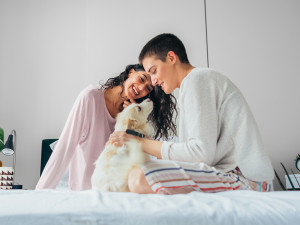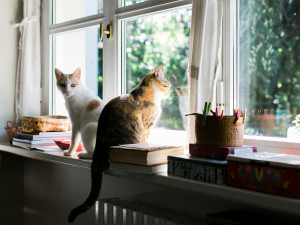
share article
It’s a classic instinct for people with a lot of time on their hands to think they’re going to learn a foreign language. I’ve never had those ambitions, but with more “free time” than usual over the past couple years, I did accidentally master a new dialect. Or not really a dialect: I’ve learned an accent of unknown origin and provenance, which I speak only to the dog. Like the truly fluent, I was entirely unaware I was even speaking something outside the lingua franca until someone pointed it out to me. The particular cadences are best exemplified by the phrase goooooodddd bow, which occurs every single time the dog stretches.
Whenever I speak to the dog, I feel my voice drop into my chest, into a fawning, cooing mumble. The accent is best for gushing and is also characterized by specific, thrilled emphasis on irregular words such as bed (it’s actually beh-ed, which my vocal-coach friend told me is a diphthong). The accent manifests in salmon (very long ahhhh in the middle somehow) and trick toy (I can only describe this as like a bird song; and it refers to the Wicked Boneopens in a new tab, which is a very fun toy that’s also a trick and always gets a pounce out of the pup). Snack (it’s actually a snick-snack) is a very sharp example.
I’m certain I’d hate my pet accent if I heard it, but I’m blessed, as the speaker, that I don’t have to listen to it. And, at the very least, I don’t do British, which I’ve heard is a frequent instinct for people speaking to very distinguished gentleman animals. My former roommate once dated someone, briefly, who spoke to her cat, Tulip, with a British accent. Tulip did have a very regal slither to her walk, she seemed haughty, and she was named for an expensive tall flower. I understood the associations. So the assessment of the accent didn’t feel wrong, but it was still unbearable to listen to. My roommate’s suitor asked if they should both bring Tulip on a weekend trip to Joshua Tree and my roommate practically yelled “NO.” “I said no instantly, and I realized it was because I couldn’t hear the British accent all weekend! I’d die,” she said. And then, the mind jumps: they couldn’t possibly ever live together! And the relationship, suddenly, is curtailed. I watched Tulip that weekend and resisted anything proper at all in my tone.
It can feel helpful to hear someone’s irritating “pet voice” early; like going grocery shopping with someone in the first few weeks and seeing what snacks they acquire. It’s a lot of very helpful information. My college friend went back to someone’s house after a first date, very interested in sleeping over, and nearly left solely because of the voice he used to introduce and address his cat. “It was like a muppet!” And the cat, she says, was not having it. “I could have understood that silly-billy-boy voice to talk to a puppy, but this 13-year-old cat just looked miserable.”
Another friend, after a break-up with a long-time partner, was venting all the petty complaints that felt immaterial to discuss while they were still trying to stay together. Something that emerged was that her ex spoke to her dog “really condescendingly!” She confessed that this felt stupid to focus on (also she doesn’t think her dog is a particularly bright bulb, either) but it always bothered her that the tone was belittling. And we agreed: the dog could definitely tell, and never seemed to like the ex that much anyway. So even though there was no accent — nothing goofy or silly — the tone was off. And it’s the tones we take with each other, especially with animals, that communicates the whole subtext for how we think of them. They might not understand, but they also do.
The way I speak to my dog, I’m clearly deluded we’re living in a hilarious world of delights. I feel like my voice wouldn’t be out of place coming from a cloud in a cartoon. But, I know I’m actually the wrong person to critique my own voice. I think we can’t ever really hear them. My partner just told me that I call the dog angel, which I didn’t believe, and then I heard myself do it about six times a day. I’m not sure I know our dog’s name anymore! When a plumber was fixing the sink a couple weeks ago, I became very aware every time my partner or I passed the dog, we murmured constant words of affirmation, in very similar sounding accents. All these voices are annoying — it’s just that our version of annoying is well-matched to one another. No one else has to hear us except the dog, who can’t understand where our accents are coming from, but I like to believe he gets it.

Maggie Lange
Maggie Lange is a writer, editor, and columnist. Her work has been featured in New York Magazine, Vice, Guernica, GQ, Rolling Stone, Pitchfork, Elle, and Bon Appetit. She lives in Philadelphia with her favorite brindle boy, Finn.

